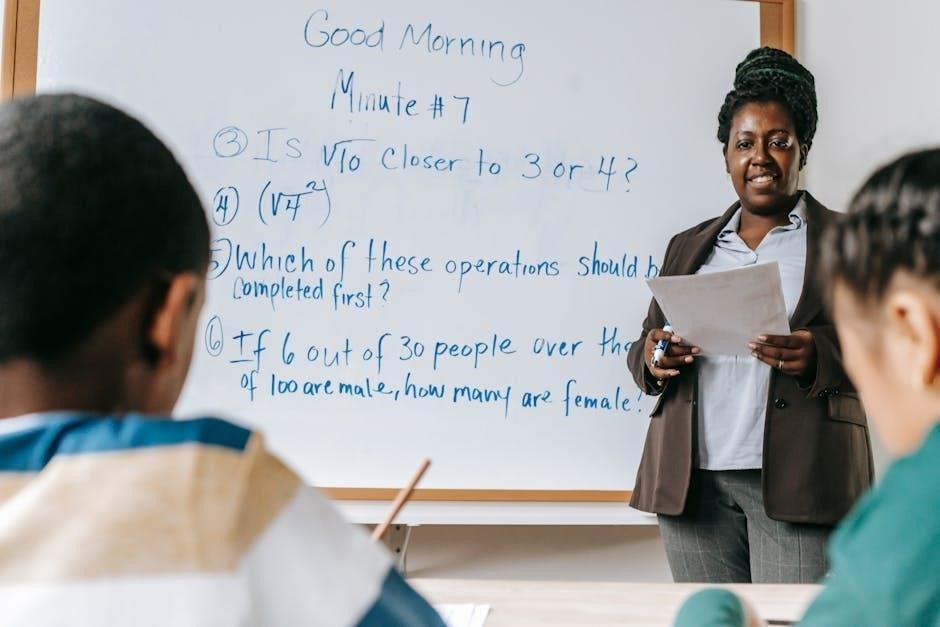An Elementary Math Olympiad is a challenging competition designed for young students to test their mathematical skills and foster a love for problem-solving and logical thinking.
What is an Elementary Math Olympiad?
An Elementary Math Olympiad is a competitive event designed for young students to engage in challenging mathematical problems. It aims to nurture problem-solving skills, critical thinking, and creativity. Unlike regular exams, Olympiads focus on deeper understanding and innovative approaches rather than rote learning. Participants are typically elementary school students, and the problems often involve algebra, geometry, and number theory. The competition is part of a broader movement to identify and support mathematically gifted students, encouraging them to pursue advanced studies. It also serves as a platform for students to showcase their talents and gain confidence in their mathematical abilities. The Elementary Math Olympiad is a stepping stone for those interested in higher-level competitions and a lifelong love for mathematics.
Importance of Participating in Math Olympiads for Young Students
Participating in Math Olympiads is highly beneficial for young students as it enhances their problem-solving skills, fosters critical thinking, and encourages creativity. These competitions provide a platform for students to challenge themselves beyond the classroom, building confidence and resilience. By engaging with complex problems, students develop a deeper understanding of mathematical concepts and learn to approach problems from multiple angles. Olympiads also cultivate a growth mindset, motivating students to pursue excellence and view challenges as opportunities for growth. Additionally, they expose students to a competitive environment, preparing them for future academic and professional challenges. Beyond academics, Math Olympiads help students develop teamwork and communication skills, especially when collaborating with peers or mentors. Overall, participating in Math Olympiads is a valuable experience that nurtures both intellectual and personal development in young learners.

Preparation Strategies for Elementary Math Olympiad
Consistent practice, understanding problem statements, and exploring resources like books and online forums are key strategies. Seeking guidance from mentors and participating in practice contests is essential.
Understanding the Problem Statement
Understanding the problem statement is the first step in solving any Olympiad problem. It involves carefully reading and interpreting the question to identify what is being asked. Many students rush into solving without fully grasping the problem, leading to errors. To avoid this, break down the statement into key elements: given information, unknown quantities, and the specific question. Paraphrase the problem in your own words to ensure clarity. Visualizing the problem with diagrams or charts can also aid comprehension. Additionally, identifying any hidden assumptions or constraints is crucial. Taking time to thoroughly understand the problem sets the foundation for an effective solution. This skill is particularly emphasized in elementary Math Olympiads to build strong problem-solving habits from an early age.
Key Resources for Preparation: Books, Websites, and Online Forums
Preparing for an Elementary Math Olympiad requires access to the right resources. Books like “Mathematical Olympiad Challenges” and “Elementary and Intermediate Algebra” provide foundational concepts and practice problems. Websites such as Khan Academy and Art of Problem Solving (AoPS) offer interactive lessons and past competition papers. Online forums like Math Stack Exchange and AoPS forums allow students to discuss problems and seek guidance from peers and mentors. These resources help students build problem-solving skills, understand competition formats, and stay motivated. Utilizing these tools effectively can significantly enhance a student’s performance in math competitions. They also foster a community of learners who share knowledge and strategies for success.

Common Problem Types in Elementary Math Olympiad
Elementary Math Olympiad problems often involve algebra, number theory, geometry, and combinatorics, testing logical thinking, problem-solving, and creativity in young participants.
Algebra and Number Theory Problems
Algebra and Number Theory problems are fundamental in Elementary Math Olympiads. These questions test a student’s ability to solve equations, manipulate variables, and understand properties of numbers. Examples include solving linear equations, finding patterns in sequences, and determining divisibility rules. Number Theory problems often involve prime numbers, factors, and multiples, requiring logical reasoning and quick calculations. Algebra problems may ask students to simplify expressions or solve systems of equations. These problems help build foundational math skills and encourage creative thinking. Students are encouraged to use problem-solving strategies like substitution, factoring, and trial and error. Practicing these types of problems is essential for developing confidence and speed in math competitions. Resources like textbooks and online forums provide ample practice material for mastering these concepts.
Geometry and Combinatorics Problems
Geometry and Combinatorics problems are essential components of Elementary Math Olympiads. Geometry problems often involve analyzing shapes, calculating areas, and understanding spatial relationships. Students may be asked to prove properties of triangles, circles, or polygons using basic theorems and principles. Combinatorics problems focus on counting and arranging objects, requiring logical reasoning and pattern recognition. Examples include determining the number of ways to arrange items or finding the shortest path in a grid. These problems enhance spatial awareness and logical thinking. Resources like geometry workbooks and online platforms provide practice materials. Modern tools, such as AlphaGeometry, have also demonstrated the ability to solve complex geometry problems, inspiring new approaches to problem-solving. Mastery of these areas is crucial for excelling in math competitions and developing advanced mathematical skills.

Role of Mentors and Local Math Clubs
Mentors and local math clubs play a vital role in guiding young Olympiad participants, offering personalized support, and fostering a collaborative learning environment that nurtures mathematical talent and enthusiasm.
How Experienced Mentors Can Guide Young Olympiad Participants
Experienced mentors play a crucial role in guiding young Olympiad participants by providing personalized support and expert knowledge. They help students break down complex problems into manageable parts, using relatable examples and clear explanations. Mentors often share proven strategies for problem-solving, emphasizing logical thinking and creativity. By fostering a deeper understanding of mathematical concepts, mentors enable students to approach challenges with confidence. They also encourage critical thinking and mathematical reasoning, essential skills for success in Olympiad competitions. Additionally, mentors offer emotional support, helping students build resilience and maintain a positive mindset, especially during periods of intense preparation or competition pressure. Regular practice sessions and feedback from mentors further enhance a student’s ability to tackle diverse problem types effectively.
Benefits of Joining Local Math Clubs for Olympiad Preparation
Joining local math clubs offers numerous benefits for young Olympiad participants, fostering a collaborative and supportive environment for learning and growth. These clubs provide opportunities to engage in group problem-solving sessions, where students can share ideas and learn from one another. Exposure to diverse problem-solving approaches enhances creativity and critical thinking. Additionally, math clubs often organize practice competitions and workshops, simulating real Olympiad conditions and helping students build confidence; Experienced mentors and peers in these clubs also provide valuable feedback and encouragement. By participating in club activities, students develop teamwork skills and a stronger passion for mathematics. The motivating atmosphere of local math clubs ensures that young participants are well-prepared and inspired to excel in their Olympiad journey, both individually and as part of a community.

Modern Tools and Technologies in Math Olympiad
Modern tools and technologies, such as math software and online platforms, revolutionize Olympiad preparation by offering interactive learning, real-time feedback, and access to advanced problem-solving resources.
Use of Large Language Models (LLMs) in Solving Math Problems
Large Language Models (LLMs) like AlphaGeometry are transforming how math problems are solved, offering powerful tools for Olympiad preparation. These models can process complex mathematical expressions and provide step-by-step solutions, enabling students to understand problem-solving strategies better.
LLMs also assist in learning by generating practice problems and explaining concepts in an accessible way. Their ability to analyze patterns and provide insights makes them invaluable for exploring advanced mathematical ideas.
Moreover, LLMs support traditional study methods, helping students grasp difficult concepts and fostering innovation in problem-solving techniques. This integration of AI with math education is reshaping the landscape of Olympiad training and mathematical exploration.
Impact of AI Tools like AlphaGeometry in Olympiad Training
AI tools like AlphaGeometry are revolutionizing Olympiad training by providing advanced problem-solving capabilities and personalized learning experiences. AlphaGeometry, leveraging Google’s Gemini model, excels in solving complex geometry problems, offering detailed step-by-step solutions and explanations that enhance students’ understanding of mathematical concepts.
These tools not only generate practice problems tailored to individual needs but also analyze patterns and provide insights, fostering innovation in problem-solving techniques. By complementing traditional study methods, AI tools like AlphaGeometry make high-quality math training accessible to a diverse range of students, promoting inclusivity and excellence in Olympiad preparation.
Overall, the integration of AI in math education is transforming how students prepare for competitions, enhancing their skills and inspiring a deeper exploration of mathematics.
Elementary Math Olympiads foster creativity, logic, and problem-solving skills, inspiring young minds to embrace mathematics and preparing them for future academic and competitive challenges with confidence.
Final Tips for Success in Elementary Math Olympiad
- Practice consistently: Regular practice sharpens problem-solving skills and builds confidence.
- Solve past papers: Familiarize yourself with question formats and difficulty levels by solving previous years’ Olympiad problems.
- Stay calm under pressure: Maintain focus and composure during the competition to avoid errors.
- Use online resources wisely: Leverage websites, forums, and tools like LLMs to enhance your preparation.
- Join study groups: Collaborate with peers to discuss problems and learn from one another.
- Seek mentorship: Guidance from experienced mentors can provide valuable insights and strategies.
By following these tips, young participants can maximize their potential and perform exceptionally in the Elementary Math Olympiad.
Encouraging a Love for Mathematics Beyond Competitions
Fostering a genuine interest in mathematics is essential for long-term success. Encourage students to explore math through puzzles, games, and real-world applications, making it fun and relatable. Celebrate their progress, no matter how small, to build confidence and a growth mindset. Provide access to engaging resources like math-themed books, videos, and interactive tools to deepen their curiosity; Emphasize the value of math in everyday life, such as problem-solving and critical thinking. By nurturing a passion for mathematics, students will view it as more than just a competition—it becomes a lifelong skill and source of enjoyment.
- Make math a part of daily routines through fun activities.
- Praise effort, not just results, to encourage perseverance.
- Connect math to hobbies or interests to spark enthusiasm.
This approach ensures a lasting appreciation for mathematics beyond the competition environment.

